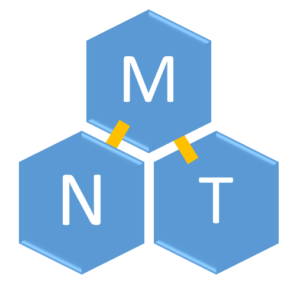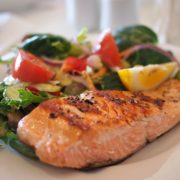Eat this to feel Happy- Serotonin
Brain Electricity, Neurotransmitters, and Food
What if I told you that food really could be the source of all your happiness, security, love, and well-being? I’m not talking about that midnight cheesecake binge we all tried to forget about. I’m talking about real honest meals leading you to a state of mental satisfaction that lasts past that first bite. But first….
Lets break this down neurologically, shall we? Hold tight, you only have to read this prologue once. (Cue Bill Nye Theme Song)
The brain is the greatest generator of electricity in the body, and the manner in which that electricity is generated and then distributed throughout the brain and the body is governed by the four primary neurotransmitters: dopamine, acetylcholine, GABA, and serotonin. Each of these neurotransmitters is associated with a specific type of brain wave, and is generated in a specific area of the brain. Each neurotransmitter is powerfully involved in generating specific states of being and personality traits, and deficits in any of the neurotransmitters can be seen in resultant personality traits, behaviors, tendencies and disorders. Restoration of proper neurotransmitter balance, which maximizes the positive effects of each neurotransmitter, can be achieved through interventions in nutrition, supplementation, exercise, behavior/lifestyle, and prescription medication. Eufinity Labs “Mood Meals” focuses on nutritional intervention by promoting foods that provide the building blocks necessary to synthesize specific neurotransmitters and by discouraging foods and substances that serve to deplete those neurotransmitters or reduce their bioavailability.
Each neurotransmitter has a specific role in the electrical signals that power the brain and body. Dopamine is responsible for the voltage or power of the electricity. Acetylcholine is responsible for the speed at which the electricity travels. GABA generates the rhythm, which ideally is a smooth, even flow of electricity. Serotonin provides the synchronicity of electrical flow, which is generated in waves that ideally emanate evenly into all areas of the brain (frontal & rear lobes, left & right hemispheres) in synchrony. Dopamine and acetylcholine behave like the brain’s ON switches that give us power and speed; whereas GABA and serotonin behave like OFF switches (especially GABA) and a reset button (serotonin) (1,2).
Today, We’ll be focusing on the brain’s natural “happy pills”, and how to access them using everything you have in your kitchen. (Or more realistically, everything that’s at your local grocery store!)
Serotonin
Serotonin is responsible for the synchronicity of electrical current in the brain. The brain’s electricity travels in waves. Serotonin regulates all four types of brain waves. Ideally, serotonin allows the waves to emanate evenly throughout the brain, spreading from the center with good symmetry through the front and rear lobes and the right and left hemispheres. Serotonin, like GABA, is a bio-chemical “off switch.” By permitting a good night’s sleep, it lets the brain reset and resynchronize. Serotonin provides feelings of well-being and serenity, a willingness to engage in new challenges and try new things, allows us to feel good about ourselves, and can cause us to feel playful and experience enjoyment.
Low levels of serotonin can cause a loss of enthusiasm, a sense that you just don’t feel like yourself, varying levels of depression, general unhappiness, insomnia and other sleep disorders (including hypersomnia), unexplained fearfulness or generalized guilt, reduced sensitivity to the five senses, food cravings and eating disorders, self-absorption (as one loses sensitivity to and interest in others), hormonal disorders, PMS, and OCD.
Serotonin is produced in the occipital lobes of the brain. The occipital lobes generate Delta waves that travel at 1-4 cps and indicate some level of sleep. (1,2)
Neurotransmitter- SEROTONIN
Balanced levels of serotonin are associated with …
Deep restful sleep, feeling alive & excited about challenges, feeling good about yourself, serenity (1,91), playful (2, 138)
A person with deficient levels of serotonin is likely to feel…
Apathetic, crotchety, withdrawn, depressed, blue, less willing to take chances, unable to sleep/insomnia, unlike themself (1, 91), like their 5 senses are dulled (searching for an elusive taste/flavor) (1, 92),
Recent bouts of aggression/drastic temperament change, frequent anxiety/irritability, hopeless, poor impulse control, indecisive, persistent unexplained guilt, sad/tearful/generally unhappy/suicidal, obsessive-compulsive, reliant on alcohol or drugs to change mood, self-absorbed (1,96-97)
Likely to crave salty foods & simple carbs (1, 91-92), Likely to engage in emotional eating (1, 91,92,96)
FOOD
Quick Fix
- eat salmon, avocado, & brown rice
- eat a hard boiled egg
- eat yogurt
- eat an ounce of dark chocolate (minimum 70% cocoa)
- eat a pear
- have a whey protein shake
Foods to eat regularly
- chicken
- cottage cheese
- yogurt
- eggs,
- milk (whole)
- duck
- pork
- turkey
- avocado
- dark chocolate (minimum 70% cocoa)
- wheat germ
- granola
- oatmeal
- pears
- broccoli
- brown rice
- salmon
- trout
- herring
- sardines
- mackerel
- soy beans, soy products
- kelp, sea vegetables
- whole grains
WHY: foods a – m are high in tryptophan, the amino acid building block of serotonin. Serotonin is the “feel-good” neurotransmitter. Tryptophan foods also help to prevent overeating.1 Foods m – p boost serotonin and absorb excess estrogen1
Make Me Feel Better Meal
- brown rice bowl with turkey, broccoli, & shelled edamame (soybeans), & mushrooms. Season with Braggs Liquid Aminossoy sauce alternative
- grilled salmon with dill sauce (plain greek yogurt with a generous amount of dill mixed in to taste. Microwave to warm); steamed broccoli; salad of pear, avocado, & orange sections served over mixed greens; peppermint tea with lowfat milk for dessert
- Brown rice & milk bowl, sprinkled generously with cinnamon & sweetened with stevia. Add a scoop ofvanilla whey protein powder if desired.
SPICES TO DISPELL SADNESS
- saffron
- Marjoram
- peppermint
- spearmint
- dill
- nutmeg
- licorice (anise)
- turmeric
TEA TREATMENT
- peppermint tea
- licorice spice tea
Also serotonin related:
When tummy says: GIVE ME CARBS, NOW!
Eat this instead:
1. Quick Fix
- eat an apple
- eat some unsalted almonds
- eat some baby carrots
- enjoy 1 oz. dark chocolate (at least 70% cocoa) dipped in 1 tablespoon naturalalmond butter (only ingredient is almonds)
- eat apple slices dipped in natural almond butter (only ingredient is almonds)
B. SPICES
- cinnamon
- fennel
5. AVOID
- salty foods (list 1, 92)
- simple carbs (“white” foods like rice, pasta, breads)



